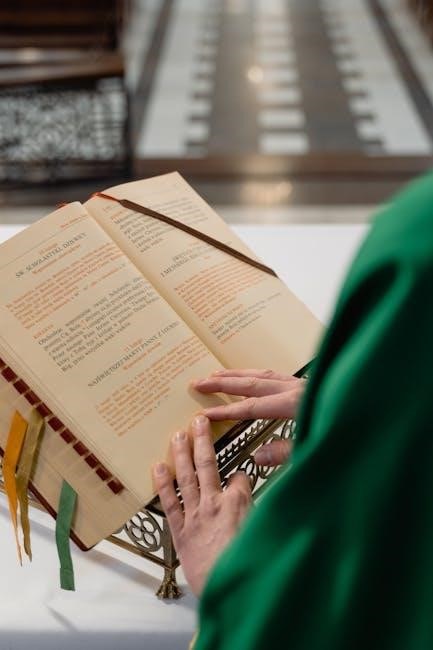The Book of Ruth offers rich spiritual lessons, showcasing loyalty, divine providence, and transformation from sorrow to joy․ Set during the Judges’ era, it highlights God’s hidden workings and redemption, providing timeless wisdom for believers today․
The Power of Loyalty and Devotion
The Book of Ruth beautifully illustrates the power of loyalty and devotion through Ruth’s unwavering commitment to Naomi and Boaz’s compassionate treatment of Ruth․
Ruth’s Unwavering Commitment to Naomi
Ruth’s unwavering commitment to Naomi is a profound spiritual lesson in loyalty and devotion․ Despite the loss of her husband and the hardships she faced, Ruth refused to abandon Naomi, even when encouraged to do so․ Her famous declaration, “Where you go, I will go, and where you stay, I will stay” (Ruth 1:16-17), underscores her deep dedication․ This commitment reflects not only her love for Naomi but also her trust in Naomi’s God․ Ruth’s actions demonstrate how loyalty transcends blood ties and becomes a spiritual choice, inspiring believers to remain faithful to their loved ones and their faith, even in challenging circumstances․ Her story teaches us the importance of standing by one another and trusting God’s providence in all seasons of life․
Boaz’s Loyal Treatment of Ruth
Boaz’s loyal treatment of Ruth exemplifies humility, kindness, and godly character․ He went beyond the law, showing compassion by allowing Ruth to glean in his fields and ensuring her safety․ His actions reflected a deep respect for her dignity and a commitment to caring for the vulnerable․ Boaz’s loyalty was not only to Ruth but also to Naomi, as he sought to restore their lives․ His kindness demonstrated the spiritual lesson of treating others with grace and generosity, regardless of their circumstances․ Boaz’s actions also foreshadow the ultimate redeemer, Jesus Christ, who would bring salvation to all․ This story teaches believers the importance of humility, compassion, and faithfulness in their interactions with others, mirroring God’s love and provision․
God’s Providence in Times of Sorrow
The Book of Ruth illustrates God’s providence transforming sorrow into joy․ Ruth’s life, once marked by loss, becomes a testament to divine guidance and restoration through faith․
From Tears to Joy: The Transformation in Ruth’s Life
Ruth’s journey from tears to joy is a profound example of God’s providence․ Initially overwhelmed by widowhood and poverty, she found hope through Naomi’s guidance and Boaz’s kindness․ Her loyalty and faith were rewarded as she became part of a noble lineage, even an ancestor of King David and Jesus․ This transformation shows God’s ability to turn sorrow into joy, emphasizing trust in His plan․ Ruth’s story teaches us to remain faithful during hardships, trusting that God works behind the scenes to bring redemption and joy․
How God Works Behind the Scenes
The Book of Ruth beautifully illustrates how God works discreetly, orchestrating events for His purpose․ Ruth’s chance encounter with Boaz in the field, Naomi’s strategic counsel, and Boaz’s noble actions all reflect divine providence․ These seemingly ordinary moments were part of God’s larger plan to bring redemption and joy․ The story shows that God often works quietly, using everyday circumstances to fulfill His will․ This teaches believers to trust in His unseen hand, even during life’s challenges․ Ruth’s life is a testament to how God weaves individual stories into His grand narrative of redemption․ This subtle yet powerful divine intervention reminds us to have faith in His plan, even when the path is unclear․

The Importance of Humility and Kindness
Boaz exemplifies humility by treating Ruth with kindness beyond the law, while Ruth’s steadfast loyalty to Naomi reflects the transformative power of selfless love․

Boaz’s Humility in Dealing with Ruth
Boaz demonstrated remarkable humility by going beyond the law in his treatment of Ruth, a foreigner․ He showed compassion by allowing her to glean in his fields and ensuring her safety․ His actions reflected a deep respect for her dignity and a commitment to kindness, even when it was not required․ Boaz’s humility was evident in his willingness to help someone in need without seeking recognition or reward․ His selfless behavior serves as a powerful example of how humility and kindness can transform lives and communities․ Through Boaz, we learn that true humility is expressed through actions that uplift others and honor God․
Lessons from Boaz’s Acts of Kindness
Boaz’s kindness to Ruth teaches us the importance of selfless love and compassion․ By providing for her needs and protecting her, Boaz exemplified how kindness can transform lives․ His actions reveal that true kindness goes beyond obligation, showing grace to those who may seem insignificant․ Boaz’s generosity also highlights the value of treating others with dignity, regardless of their background․ These lessons encourage believers to emulate such kindness in their interactions, fostering a spirit of community and care․ Through Boaz, we see how acts of kindness can reflect God’s love and bring joy even in difficult circumstances, leaving a lasting impact on those around us․
The Concept of Redemption in the Book of Ruth
The Book of Ruth beautifully illustrates redemption through Boaz, who restored Naomi’s inheritance and married Ruth, symbolizing divine rescue․ This points to Jesus, our ultimate Redeemer․
Boaz as a Redeemer
Boaz exemplifies redemption by taking Naomi’s inheritance and marrying Ruth, a foreigner, demonstrating God’s grace․ His actions mirror divine rescue, showing how God restores through faith and love, reflecting the ultimate redemption through Christ, who redeems all people from sin․ Boaz’s role as a redeemer highlights the biblical theme of restoration, offering hope to believers today, as seen in the transformation of Ruth’s life from sorrow to joy, underscoring God’s providence and faithfulness in all circumstances․
The Ultimate Redeemer: Jesus Christ
Jesus Christ is the ultimate redeemer, fulfilling the shadow of redemption seen in Boaz’s actions․ Through His sacrifice, Jesus restores humanity from sin, mirroring how Boaz redeemed Ruth․ The Book of Ruth foreshadows Christ’s universal redemption, as Ruth, a foreigner, becomes part of His lineage․ Jesus’s love and grace extend to all, regardless of background, reflecting God’s plan to redeem the world․ This redemption brings hope and transformation, transforming sorrow into joy, much like Ruth’s journey․ Christ’s role as the ultimate redeemer emphasizes God’s faithfulness and love, offering believers eternal salvation and a restored relationship with Him․

The Role of Faith in Overcoming Adversity

Ruth’s journey from faith to trust illuminates the transformative power of believing in God’s plan․ Her steadfastness, even in uncertainty, exemplifies how faith guides us through life’s challenges and restores hope․

Ruth’s Journey from Faith to Trust
Ruth’s journey from faith to trust is a remarkable example of spiritual growth․ Initially, her faith was rooted in loyalty to Naomi, but it deepened into a personal trust in God․ Despite facing widowhood, poverty, and cultural barriers, Ruth’s unwavering commitment to Naomi and her God reflects her evolving trust․ Her declaration in Ruth 1:16-17, “Where you go, I will go,” signifies a leap of faith, not just in Naomi, but in Naomi’s God․ This trust was tested as she navigated unfamiliar customs and relied on God’s providence․ Ultimately, Ruth’s trust in God led to redemption and a place in the lineage of Christ, demonstrating how trust in God transforms adversity into divine purpose․
Naomi’s Restoration of Faith
Naomi’s journey in the Book of Ruth vividly illustrates the restoration of faith amidst sorrow․ Initially, Naomi felt abandoned by God, returning to Bethlehem empty and bitter, even renaming herself Mara․ However, through Ruth’s loyalty and Boaz’s kindness, Naomi began to see God’s providence․ The birth of her grandson, Obed, who became part of King David’s lineage, revealed God’s hidden workings․ Naomi’s faith was restored as she recognized God’s redemption and provision, transforming her bitterness into joy․ Her story teaches that even in darkness, God works behind the scenes, bringing hope and renewal․ Naomi’s restoration of faith underscores the theme of divine providence and the power of trust in God’s plan, offering timeless lessons for believers facing adversity․

The Historical and Cultural Context
The Book of Ruth is set during the period of the Judges, a time of moral and spiritual weakness in Israel․ Bethlehem, once a symbol of abundance, faced famine, reflecting the nation’s spiritual state․ The story highlights God’s work during a chaotic era, emphasizing His love for all people, regardless of cultural background․ This historical context underscores the universal themes of faith and redemption, making Ruth’s story a timeless lesson in trust and divine providence․ The cultural setting also reveals the significance of family and community, central to Hebrew tradition, further enriching the narrative’s spiritual depth․
The Period of the Judges
The Book of Ruth is set during the era of the Judges, a time marked by moral and spiritual decline in Israel․ Judges 17:6 highlights the chaos, as “everyone did what was right in their own eyes․” This period, characterized by cycles of sin, repentance, and deliverance, reflects Israel’s spiritual weakness․ The story of Ruth, however, stands out as a beacon of hope amid this turmoil․ It illustrates how God works even in darkness, using ordinary lives to reveal His faithfulness․ The historical context underscores the universal themes of redemption and divine love, showing how God’s plan transcends human failure․ This backdrop of moral decay contrasts sharply with Ruth’s unwavering faith and loyalty, offering profound spiritual lessons for believers today․ The period of the Judges thus serves as a reminder of God’s sovereignty and grace in all seasons of life․
The Significance of Bethlehem

Bethlehem, known as the “House of Bread,” holds profound spiritual significance in the Book of Ruth․ Despite its name, Bethlehem experienced famine and judgment, symbolizing spiritual barrenness․ Yet, it was here that Naomi and Ruth’s journey began, leading to redemption and renewal․ The city’s connection to David and ultimately Jesus Christ underscores its role in God’s redemptive plan․ Ruth’s story transforms Bethlehem’s symbolism from scarcity to abundance, reflecting God’s ability to bring life from desolation․ This mirrors the spiritual journey of believers, emphasizing trust in God’s provision even in times of lack․ The significance of Bethlehem in Ruth’s narrative highlights how God’s divine purposes often unfold in unexpected places, offering hope and renewal to those who trust Him․ This theme remains a powerful lesson for spiritual growth and faith today․
The Book of Ruth provides timeless spiritual lessons that resonate deeply with believers today․ Its themes of loyalty, divine providence, and redemption remind us of God’s faithfulness in all circumstances․ Ruth’s humility and trust in God, despite life’s challenges, inspire us to remain faithful․ The story also highlights the importance of kindness and compassion, as seen in Boaz’s actions, encouraging us to live selflessly․ Ultimately, the narrative points to Jesus Christ, the ultimate Redeemer, who brings hope and restoration․ As we reflect on these lessons, we are called to trust God’s plan, remain loyal in relationships, and live with humility and kindness․ May Ruth’s journey inspire us to walk faithfully, knowing God works behind the scenes to bring joy and redemption into our lives․



